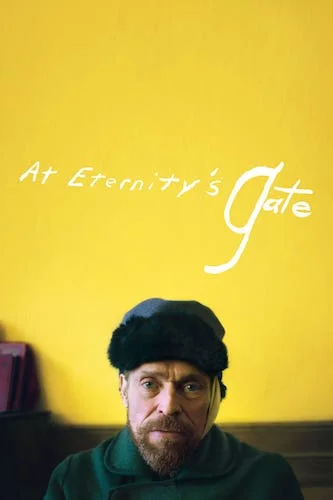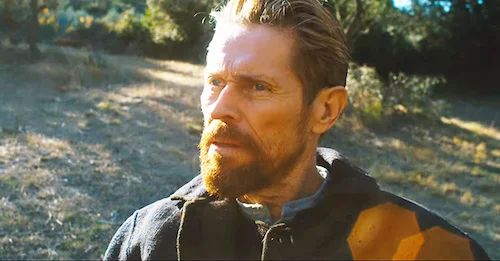At Eternity's Gate
If you are unfamiliar with Julian Schnabel, he is a visual-artist-turned-director that has always brought a unique style to the cinematic medium. He truly does view film through a different lens (so to speak). If anyone could capture the world as if it were living art pieces, it is this auteur.
A year before At Eternity's Gate, we were blessed with the conceptually astonishing Loving Vincent: a film made entirely of paintings used to animate a tale surrounding the final days of Vincent Van Gogh. The experience is unforgettable. The story, however, was sadly boring enough to distance us from the film. It was a weirdly paradoxical scenario. Do we wish to revisit the film for the groundbreaking animation? Do we wish to go through the CSI-like narrative that chases around Van Gogh's ghost through letters?
At Eternity's Gate presents a much more solid take on the final days of the great artist's morbid life. It does this without limiting itself to biopic conventions, which grants the film much breathing room with its exploration. Canary yellow walls, pristine blue skies, and pastel green plains make you feel like you are seeing the world Van Gogh vowed to capture in his works. You don't live in the paintings like Loving Vincent allowed you to, but you get to experience Van Gogh's mind. For some, that's a downgrade. For others, that's even better.
Schnabel and his team pay tribute to great filmmakers with how they present At Eternity's Gate. The existential crises surrounding a lone soul are very Bergman. The use of repeating lines of dialogue and overlaying the same shots to represent anxiety and depression echoes Godard's efforts to destroy the cinematic language. Schnabel has been influenced, but he carries his own voice. At Eternity's Gate becomes a chaotic experience, where musical cues stop abruptly (as if they were voices in Van Gogh's mind), repetition becomes punishment, and the artistic gaze becomes a curse. It is a truly spectacular experience.
Willem Dafoe as Vincent Van Gogh
There have been complaints about Willem Dafoe being too old to represent the 37 year old Van Gogh; I believe many of us have forgotten the art of performance. Dafoe pulls off the troubled painter's conflicting moods and states of calamity perfectly. When he tries to discuss his visions and voices, he's oddly serene about it all; it makes his condition even more worrisome. This is a film where you really feel like you're behind the master being portrayed, with every thick brush stroke landing (with the actor playing the artist in shot, so the illusion is ever so strong). Joining him are minor performances by Mads Mikkelsen (who pierces our soul as he tries to understand Van Gogh in a harsh way), and Mathieu Amalric (whose connectivity with Van Gogh is one of the only breaths of fresh air here). Let's not forget Oscar Isaac as Paul Gaugin, Rupert Friend as Van Gogh's brother Theo, and Emmanuelle Seigner as Madame Ginoux; all three turn in captivating and nuanced performances.
At Eternity's Gate is a film about an artist by an artist. It shows. So many artistic gambles are taken, but nothing feels disjointed. This is a reflection of a tortured genius that knew he was before his time. He knew he had permanence that the present damned him for. He had a style that didn't intentionally try to be different enough to anger and disgust. He just wanted to paint. Schnabel got it. With At Eternity's Gate, we get it, too.
Andreas Babiolakis has a Masters degree in Film and Photography Preservation and Collections management from Ryerson University, as well as a Bachelors degree in Cinema Studies from York University. His favourite times of year are the Criterion Collection flash sales and the annual Toronto International Film Festival.





